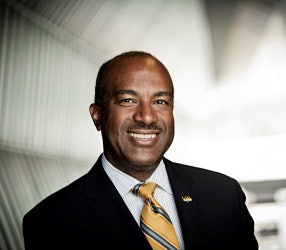The lack of Black males occupying leadership positions at institutions of higher education has been well documented. The reasons for this may vary, but there is no doubt that an increased level of mentorship, guidance and networking would widen the pathways of upward mobility in colleges and universities. Recently, a group of individuals at Georgia Tech have established the GRIOT Leadership Series to provide mentoring and guidance for employees to navigate the institution and move to higher positions.
The GRIOT Series highlights the achievements and success of African-American males in various leadership positions at the institution. The series was put in place to learn their thoughts on mentoring, engagement and networking as well as to explore different avenues toward success.
 Dr. Gary May is dean of the College of Engineering at Georgia Tech.
Dr. Gary May is dean of the College of Engineering at Georgia Tech.A recent session featured a very candid and powerful discussion by Chris Burke (director of community relations), Dr. Gary May (dean of the College of Engineering), Dr. Archie Erwin (vice president of institute diversity), S. Gordon Moore Jr. (executive director of student diversity and inclusion), Marvin Lewis (associate athletic director for finance and administration), and Ricky Rowe (senior educational facility planner).
The presence and performance of these individuals not only provided a platform for diversity and inclusion, but they were able to provide insight on how they have impacted the culture of the campus environment. The panel explored a number of different themes and topics relating to the plight of Black males in higher educational settings.
One topic was the lack of visibility in some circumstances and the need for the dissemination of success stories. This has the capacity to aid others as they navigate the often challenging journey of succeeding as underrepresented minority at a major university. Panelists also spoke about the importance of garnering the requisite credentials and expertise to be at a level where they could make a difference in policy making arenas.
The ascension of the panel members did not come without struggle and the assistance of mentors and advocates who provided key guidance and created opportunities for them. Still, elevation was accompanied in some circumstances by marginalization as individuals had to deal with negative stereotypes and perceptions.
This sometimes created a sense of self-consciousness about how they were being perceived. One panelist spoke about a reluctance to want to be viewed as “the angry Black man” but still needing to press on key issues of inclusion. There was an internal conflict that some felt between being their authentic selves in certain settings and “wearing the mask”.
The concept of “wearing the mask” refers back to what W.E.B. Du Bois referred to as “double consciousness.” Double consciousness represents the internal conflict of an individual having a multifaceted identity. Du Bois wrote in The Souls of Black Folk that “he wishes to make it possible for a man to be both a Negro and an American without being cursed and spit upon by his fellows, without having the doors of opportunity closed roughly in his face.”
Ultimately, as one panelist expressed “wearing the mask is exhausting,” stating that “if you can’t be accepted for who you are then you don’t need to be there.” The general sentiment was that, over time, the campus environment has changed in certain areas from an atmosphere of toleration to appreciation for Black males. The participants explained how they have been able to open up doors for others and the need to create more opportunities for people to show how good they can be.
The leadership at Georgia Tech has set the tone and tenor to create the environment to facilitate positive institutional change in the area of diversity. Georgia Tech has made immense strides in recent years in the areas of access and diversity. Tech has been at the forefront of providing early STEM (science, technology, engineering, and mathematics) exposure to underrepresented groups through initiatives like Project Engages and a variety of programming with K-12 students and community groups through their Center for Education Integrating Science, Mathematics and Computing (CEISMC).
Safe spaces like the GRIOT Leadership Series where people can break down challenging issues of race and class are needed to alter deeply embedded practices and help make appropriate climate changes. It is a commendable effort that should be replicated at other institutions to promote a foundation of mentorship and engagement that will blaze pathways to success.
Dr. Marcus Bright is a political commentator and executive director of Education for a Better America. He also serves as adjunct professor of public administration and political science at Lynn University.


![Mentor Mentee [60287]](https://img.diverseeducation.com/files/base/diverse/all/image/2024/04/Mentor_mentee__60287_.662959db8fddb.png?auto=format%2Ccompress&fit=crop&h=100&q=70&w=100)


















